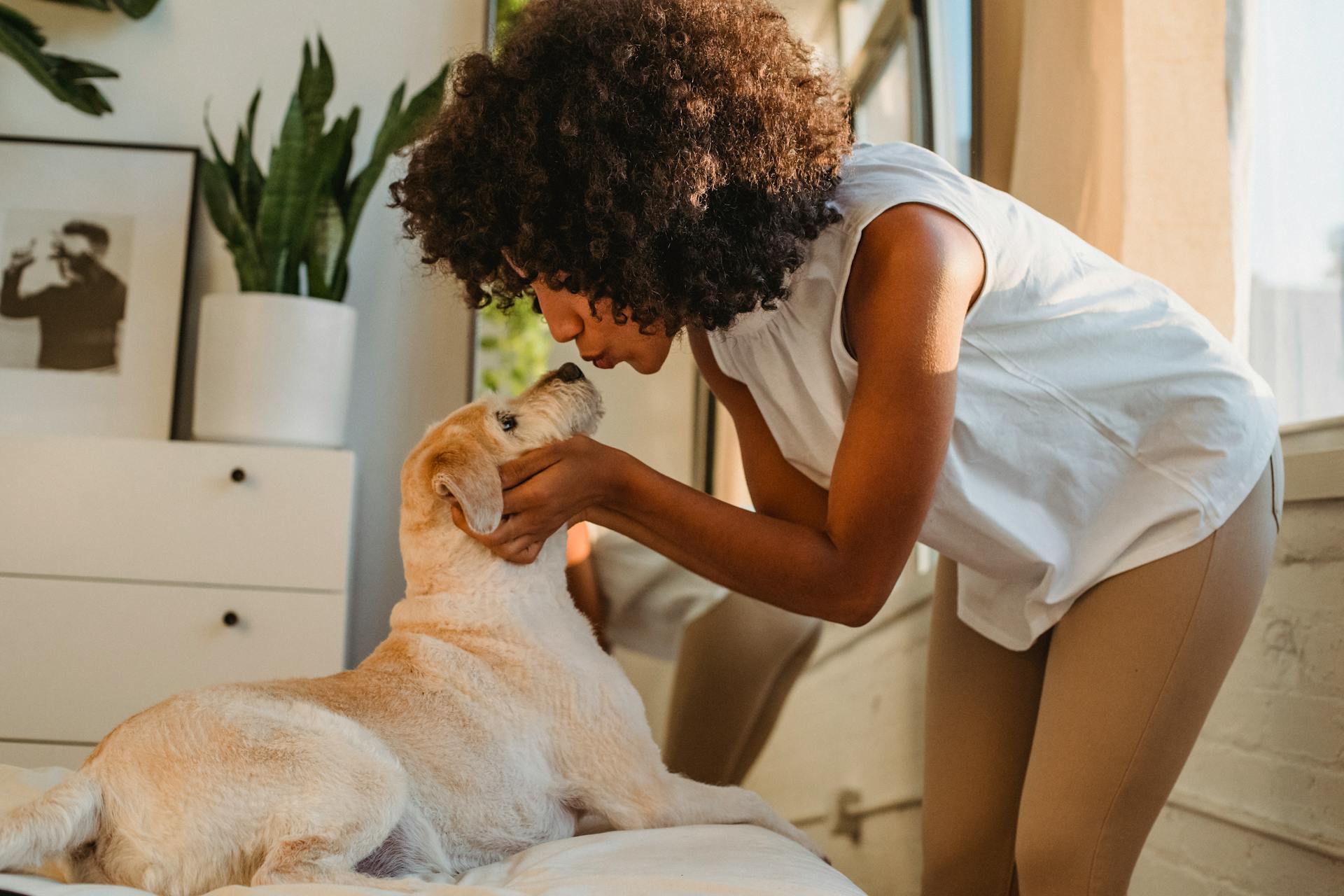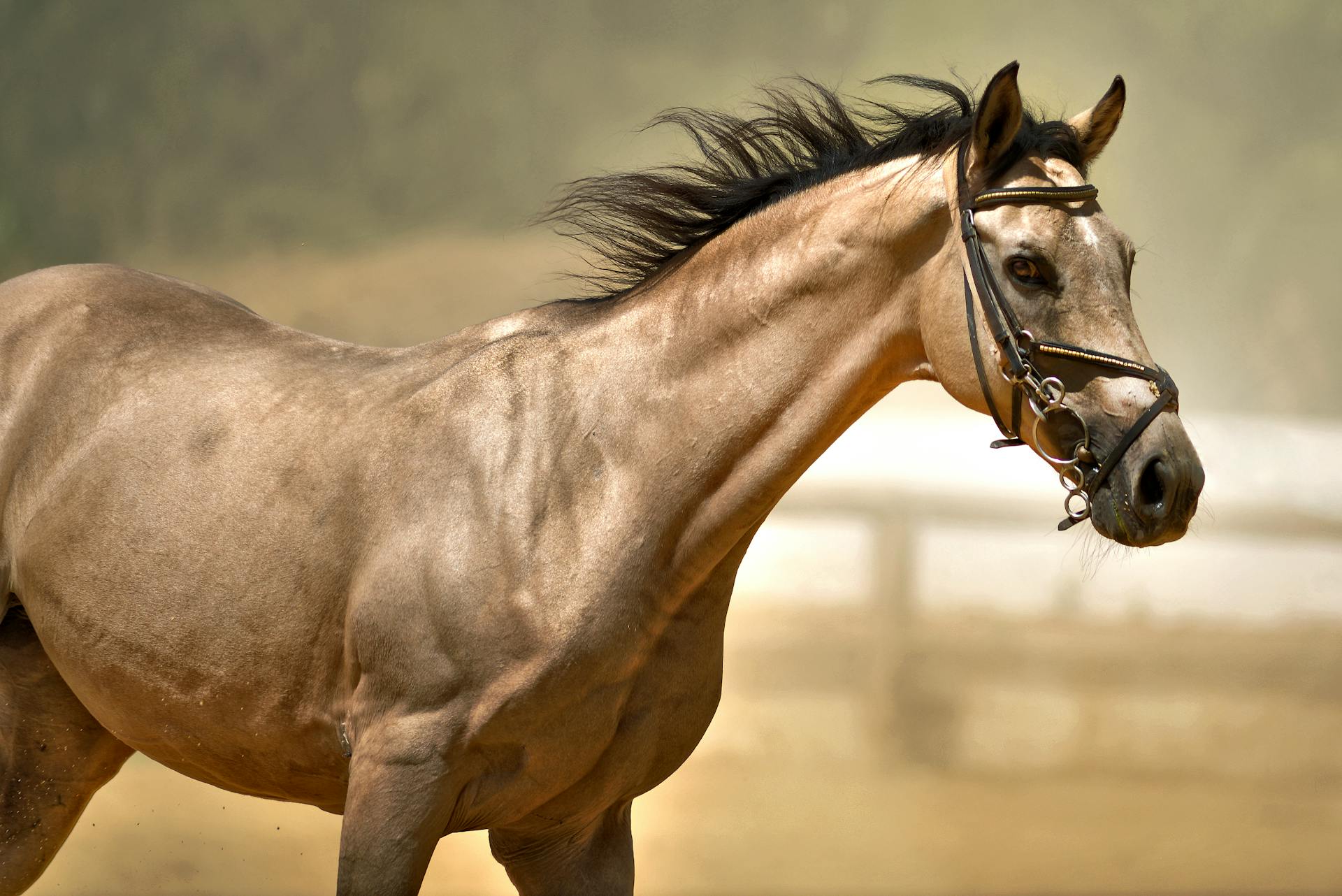
If you're considering getting an emotional support dog, it's essential to choose a breed that's well-suited for the role.
Cavalier King Charles Spaniels are a popular choice, known for their gentle and affectionate nature, which makes them an excellent match for emotional support work.
These dogs are relatively small in size, typically weighing between 10-18 pounds, and are easy to handle in various situations.
Their calm temperament and adaptability make them a great fit for people with anxiety or stress-related disorders.
Labradors, on the other hand, are highly intelligent and energetic dogs that are often used as therapy dogs.
Their friendly and outgoing personalities make them a great choice for people who need emotional support and companionship.
Their high energy levels, however, require regular exercise and mental stimulation to prevent boredom and destructive behavior.
Characteristics
These breeds are known to form strong bonds with their humans, making them ideal for emotional support animals. They're in tune with their owners' emotions and can read them well.
They respond well to training, which is a plus for owners who want a well-behaved companion.
These dogs are confident, but not aggressive or headstrong, which means they're generally easy to handle.
Benefits
Dogs are the most prevalent emotional support animals, providing a wide range of benefits for their owners.
Their companionship can help reduce anxiety and stress levels, providing significant stress relief and helping you cope with anxiety-inducing situations.
Spending time with a dog can help lower blood pressure and reduce the risk of heart disease, making them a great choice for overall health and well-being.
Emotional support dogs provide unconditional love and friendship, being great listeners and happy to cuddle up with their owner.
Owning a dog requires you to get out of the house for walks, providing the opportunity for fresh air, exercise, and meeting new people.
Choosing the Right Breed
Labrador Retrievers are another popular emotional support dog breed, known for their gentle temperaments and loving dispositions. They have a short coat of various colors and a robust build.
Their friendly, exuberant nature makes them excellent "icebreakers" for people who suffer from anxiety in social situations. This can be a big help if you're looking for a breed that will encourage you to get out of the house.
Labradors can live up to 10 to 12 years, providing a long-term companion for emotional support.
Labrador Retriever
Labrador Retrievers are a popular choice for emotional support dogs due to their calm and friendly nature. They create strong bonds with their owners and love being surrounded by their loved ones.
One of the reasons Labrador Retrievers excel as emotional support animals is their high intelligence and ease of training. They are food-motivated, which makes training a breeze. Nicole Ellis, a certified professional dog trainer, notes that this breed is "super food motivated", making them a great choice for individuals who want a low-maintenance training process.
Labrador Retrievers are also excellent at providing deep pressure therapy, which can help reduce anxiety. This can be achieved through hugging, weighted blankets, or even brushing a dog or having them lay across your body.
If you're considering a Labrador Retriever as an emotional support dog, be prepared for regular exercise and grooming. They love the outdoors and exploring, so you'll need to provide regular walks or dog park trips to keep them happy and healthy.
Recommended read: Best Food for Gassy Dogs
Here are some key characteristics of Labrador Retrievers:
Overall, Labrador Retrievers make great emotional support animals due to their calm, friendly, and gentle nature. With proper care and attention, they can provide comfort and companionship to individuals in need.
Tip
Choosing the right breed for your family can be a daunting task, but don't worry, I've got some tips to help you make the right decision.
If you're looking for a breed that's great with children, especially those with special needs, you might consider a Cavalier King Charles Spaniel. These dogs are natural companions who are happy to be petted and fussed over.
One thing to keep in mind is the lifespan of the breed. Cavalier King Charles Spaniels have a relatively short lifespan of 8 to 12 years. This means you'll have to plan for regular veterinary check-ups and potential health issues.
Their gentle and affectionate nature makes them a great choice for families with children. They're also relatively low-maintenance when it comes to exercise, happy to spend most of the day on someone's lap.
Here are some key characteristics to consider when thinking about bringing a Cavalier King Charles Spaniel into your family:
- Temperament: Gentle, affectionate, calm, loving, easygoing, trainable
- Lifespan: 8 to 12 years
- Color/Appearance: Slight build; smooth, silky coat; four recognized color varieties
Yorkshire Terrier
The Yorkshire Terrier is a fantastic breed for those looking for a loyal companion. They form strong bonds with their owners, which is perfect for individuals with depression or anxiety.
One of the best things about Yorkies is their adaptability. They can thrive in small spaces, making them ideal for apartment living. In fact, they can get most of their exercise indoors, which is a bonus for city dwellers.
Yorkies are known for their hypoallergenic fur, but it does require regular grooming. They need brushing and trimming to keep their coats looking their best.
Their small size, typically around 8 inches tall and 5-7 pounds, makes them easy to take on the go. They're also perfect for navigating anxiety-inducing social settings.
Here are some key characteristics of the Yorkshire Terrier breed:
- Temperament: Energetic, playful, feisty, loyal, affectionate
- Lifespan: 13 to 16 years
- Color/Appearance: Usually has a black and tan coat
Yorkies are intelligent and highly trainable, making them a great choice for those who want a well-behaved companion.
Pembroke Welsh Corgi
Pembroke Welsh Corgis are incredibly affectionate with their handlers and well-behaved with strangers and other animals.
They are intelligent and love having responsibilities, making them one of the best small emotional support dogs.
Pembroke Welsh Corgis are herding dogs, so they have a strong instinct to protect their owners.
These playful, easygoing pups require plenty of exercise and attention.
Their cute, expressive faces can help alleviate negative emotions.
They are perfect if you love a small yet energy-filled companion.
Pembroke Welsh Corgis are friendly dogs with a happy attitude.
They are obedient and even tempered, making them a great fit for individuals suffering from depression.
Curious to learn more? Check out: Small Dog Types with Pictures
Cavalier King Charles Spaniel
The Cavalier King Charles Spaniel is a breed that's perfect for those who need a loyal companion. They're known for their gentle and affectionate nature, making them a great choice for families with children or for individuals who want a low-maintenance pet.
Their calm demeanor also makes them a great fit for people with anxiety or PTSD, as they can provide a soothing presence. They're easy to train and are happy to be petted and fussed over by people of all ages.
One of the best things about Cavalier King Charles Spaniels is their small size, which makes them perfect for apartment living. They're also relatively low-maintenance when it comes to exercise, as they're happy to get most of their physical activity indoors.
Here are some key characteristics of the Cavalier King Charles Spaniel breed:
- Temperament: Gentle, affectionate, calm, loving, easygoing, trainable
- Lifespan: 8 to 12 years
- Color/Appearance: Slight build; smooth, silky coat; four recognized color varieties (chestnut and white, black/white/tan, ruby, and black and tan)
Despite their small size, Cavalier King Charles Spaniels are surprisingly athletic and enjoy going for walks. However, they're not as demanding as some larger breeds, and they're happy to spend most of the day on someone's lap. They also require regular grooming to keep their long coat looking its best.
Poodles
Poodles are intelligent, obedient, and dependable. Their social nature makes them ideal for working with children.
They are very easy to train and loves to learn new tricks. Poodles are hypoallergenic and do well adapting to new environments.
With proper care and nutrition, poodles can live up to 50 to 60 pounds, making them a long-lasting companion. They have hair that grows like humans, requiring regular grooming.
Toy poodles are ideal for training as an emotional support, service, and therapy dog. They aim to please and comfort their owners in every possible way.
Their calm manners are ideal for public settings, such as visiting hospitals and other medical institutions. As old hunting breeds, toy poodles respond well to new tricks and provide emotional support by lying on your lap.
Standard poodles are also lovey-dovey, eager to please, and easy to be around 24/7. They're super smart and can usually read their pet parents.
Broaden your view: English Toy Spaniel Dog
How to Make an Animal
To make an animal an emotional support animal, you'll need to consult with a licensed professional such as a doctor, counselor, or therapist. They'll determine if you have an eligible mental health condition that qualifies your pet for this role.
You can only qualify your pet if you suffer from one of the following mental health issues: learning disorders, autism, attention deficit disorder, generalized anxiety disorder, bipolar disorder, gender dysphoria, cognitive disorders, severe anxiety, post-traumatic stress disorder, or depression.
To get started, you'll need to get an emotional support animal letter from your doctor, which indicates your mental health condition and how your pet helps alleviate your symptoms. This documentation can be used to validate your need for an emotional support animal with your landlord.
Here are some mental health conditions that qualify for an emotional support animal:
- Learning disorders
- Autism
- Attention deficit disorder (ADD)
- Generalized anxiety disorder (GAD)
- Bipolar disorder
- Gender dysphoria
- Cognitive disorders
- Severe anxiety
- Post-traumatic stress disorder (PTSD)
- Depression
Popular Small Breeds
The Havanese is an adaptable breed that can thrive in air travel or road trips, making them a great option for those who need an emotional support dog. They are also non-shedding and have a calm temperament, which is ideal for traveling companions.
Toy Poodles are intelligent and highly trainable animals, making them an excellent choice for emotional support, service, and therapy dogs. They aim to please and comfort their owners in every possible way, which is a huge plus for those seeking companionship.
These small breeds are perfect for providing love, affection, and joy in compact bodies, and they often have a lively attitude, but are less active than their larger counterparts, making them a great fit for many lifestyles.
Corgis
Corgis are a great choice for an emotional support dog due to their happy, playful, and easy-going nature. They're perfect companions for those who love a small yet energetic friend.
Pembroke Welsh Corgis, in particular, are incredibly affectionate with their handlers and well-behaved with strangers and other animals. They're intelligent and love having responsibilities, making them one of the best small emotional support dogs.
Corgis are herding dogs at heart, which means they have a strong instinct to protect their owners. This instinct makes them loyal companions.
Their playful and obedient nature makes them a great fit for individuals who suffer from depression. With plenty of exercise and attention, Corgis can thrive and bring joy to their owners' lives.
Corgis are affectionate, even-tempered, and obedient dogs with a friendly disposition and happy attitude. They're a great choice for those who want a small but loving companion.
See what others are reading: Playful Breeds of Dogs
Why Choose Small
Small dogs are perfect for apartment living, making them ideal for single adults. They tend to stick to their favorite person, which is great for those living alone.
Their compact size requires less exercise, which is a bonus for elderly individuals or those with mobility issues. They're also low-maintenance when it comes to grooming and living space.
Pomeranians are a great example of a small breed that's attententive and loves having a job to do. They give plenty of affection and require little exercise, making them perfect for those who need an emotional support animal.
Small dogs have a big heart for humans, and they're highly intuitive. Pugs, for instance, are filled with tons of energy and lots of love, and they have a natural desire to want to make others feel better.
Havanese
The Havanese is an adaptable breed that's perfect for travel. They can fit into a carrier and fly with you under the airplane seat.
Their calm temperament makes them a great companion for air travel or road trips. You can take them anywhere and they'll make friends with everyone they meet.
The Havanese is a non-shedding dog, which means they're ideal for people with allergies. Their soft and furry coat is a bonus for anyone who loves cuddling.
As a friendly breed, the Havanese is always up for an adventure. They're eager to please and love having responsibilities, making them a great choice for service animals.
Their calm nature is also beneficial for public settings, such as visiting hospitals and other medical institutions. They're a great emotional support dog, always ready to comfort their owners.
Toy Poodle
Toy Poodles are highly trainable animals that are ideal for training as an emotional support, service, and therapy dog.
Their calm manners make them perfect for public settings, such as visiting hospitals and other medical institutions. They respond well to new tricks and provide emotional support by lying on your lap.
Toy Poodles have a lively attitude but are less active than their larger counterparts, making them a great choice for apartment living or for people who don't have a lot of space.
Their calm nature and ability to learn new tricks make them a great choice for people who need an emotional support animal that can provide comfort and companionship.
Dachshund
Dachshunds make excellent companions, providing emotional and therapy support, and they love sitting on their handlers' laps.
They're also natural comforters, helping anxious minds calm down with a single look at their big eyes.
Dachshunds are intelligent, affectionate, and stubborn, but they're also loving and loyal, enjoying the company of their handlers.
With adequate training, Dachshunds can even make excellent service dogs, using their unique personalities to provide assistance.
They're always nearby, ready for some cuddles, and their lively and independent nature only adds to their charm.
Popular Large Breeds
If you're looking for a large breed that can provide emotional support, you might want to consider the Newfoundland. This gentle giant is known for its calm and patient nature, making it an excellent choice for families or individuals with anxiety.
Newfoundlands are often described as "nannies" due to their natural instinct to care for and protect their loved ones. They typically weigh between 100-150 pounds and stand 26-28 inches tall at the shoulder.
Their massive size can be intimidating, but don't let that fool you - Newfoundlands are total softies at heart and thrive on human interaction.
Standard Poodle
The standard poodle is the largest of the three poodle sizes, weighing around 50 to 60 pounds.
They're known for being lovey-dovey, eager to please, and easy to be around 24/7.
You might enjoy: Best All around Dog Breed
Great Dane
The Great Dane is a gentle giant that makes a big impression with its towering physique. They can be quite intimidating, especially for strangers, but they're not unfriendly - they're just loyal and protective of their family.
Great Danes tend to be aloof with people they don't know, yet incredibly friendly with their human. They're a great breed for someone who wants a four-legged bodyguard or buffer zone when interacting with others.
Why Choose Large
Choosing a large breed can be a great option, especially if you're looking for a loyal companion. They tend to be more affectionate and loving than smaller breeds.
One of the main advantages of large breeds is their gentle nature, as seen in the gentle giant, the Great Dane, which can grow up to 175 pounds. Large breeds are often great with children.
A different take: Best Calm Large Dog Breed
Their calm demeanor makes them a great choice for families with kids. The Saint Bernard, for example, is known for its patient and even-tempered personality.
Large breeds are often easier to train than smaller breeds, thanks to their intelligence and willingness to please. The Irish Wolfhound, one of the tallest breeds, is highly intelligent and trainable.
However, it's essential to consider the space and exercise needs of large breeds, as they require regular physical activity to stay healthy. The Great Dane, for instance, needs daily walks and a spacious living area.
Overall, large breeds can make wonderful pets for the right owner, offering loyalty, affection, and a unique personality.
Mixed and Other Breeds
Mixed and other breeds can make excellent emotional support dogs. They're often a combination of two or more breeds' characteristics, which can result in unique personalities.
Their temperaments can vary greatly, with some showcasing protective traits and making excellent guard dogs. Others might be more sociable and affectionate.
Mixed breeds are likely to be healthier than purebreds, who are more prone to hereditary issues. This is a major advantage for emotional support dogs, as they require regular care and attention.
You can get mixed breeds to perform easy tasks with positive reinforcement and training. They're highly trainable, which makes them a great choice for emotional support roles.
Service and Emotional Support
Some common misconceptions exist about service dogs, but it's essential to understand the truth about these four-legged heroes.
Small breeds can make excellent emotional support and service dogs, and there are many breeds to consider if you need one.
Psychiatric service dogs are ideal for people who experience anxiety, stress, and depression, and they can perform deep pressure stimulation using the command "lap".
These tiny pups have a big heart for humans and can provide comfort and support in times of need.
Rather large dogs can make deep pressure stimulation difficult, which is why small breeds are often a good choice.
Frequently Asked Questions
What is the best dog for anxiety?
For individuals with anxiety, a gentle and affectionate breed like the Cavalier King Charles Spaniel can provide comfort and companionship, making them an excellent choice. Their calm nature and loving personality can help alleviate anxiety symptoms and create a soothing atmosphere.
What is the most empathetic dog breed?
Labradors are known for their friendly and adaptable nature, making them an excellent choice for emotional support and therapy work. Their empathetic temperament is well-suited for roles such as guide dogs and therapy dogs.
What are the best emotional support animals for anxiety?
For anxiety, popular emotional support animals include gentle breeds like Cavalier King Charles spaniels, golden retrievers, and poodles, as well as smaller pets like cats and rabbits. These animals can provide comfort and companionship to help alleviate anxiety symptoms.
Sources
- https://www.rd.com/article/best-emotional-support-dogs/
- https://www.thesprucepets.com/best-emotional-support-dog-breeds-4587718
- https://pettable.com/blog/best-emotional-support-dogs
- https://www.jadcommedia.com/best-small-emotional-support-and-service-dog-breeds/
- https://usdogregistry.org/blog/emotional-support-animal/top-emotional-support-dog-breeds/
Featured Images: pexels.com


